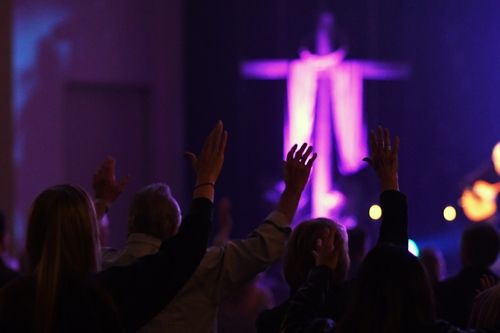
I loved Pastor Jason’s title for our Easter Sunday’s message, because our spiritual lives depend on both events. They were important topics to Jesus. He connected and predicted both the cross and His resurrection at least three times in the book of Mark (Mark 8:31, 9:31, and 10:34). Theologically, one is not more important than the other.
The cross “...disarmed the powers and authorities, He made a public spectacle of them, triumphing over them by the cross.” (Colossians 2:15). The empty tomb assures us that “…we will certainly also be united with Him in His resurrection. For we know that our old self was crucified with Him so that the body ruled by sin might be done away with...” (Romans 6:5-6).
That phrase “living in the shadow of the cross” made me wonder about the properties or characteristics of a shadow. It’s interesting to consider that no matter what the color of an object is, its shadow will always be black. The bright light behind is blocked by the object and rendered as a dark shadow.
If the cross was the end of Christ’s journey, the shadow of the cross would always be seen as dark and foreboding. It was a horrific death, a dark stain on humanity that would have blocked the light of redemption forever.
But then came Sunday. Had that tomb still contained the lifeless body of Jesus, we would all be doomed to have empty lives. But the empty tomb made it so that we can all have full, vibrant lives in Christ.
When we live in both the shadow of the cross (regularly meditating on the weight of our own sin and the grace and mercy extended by Christ), and we bask in the bright, powerful light of the empty tomb, we can embrace real joy.
Christ died for our sins. Incredible leniency. Christ rose from the dead declaring victory over sin. Incredible compassion. We desperately need both truths to be operating in our lives.
In Him (considering His death and glorying in His resurrection), we have power for everyday decisions. We have strength for the journey. We have clarity of our goals. We have hope to move us forward.
Without both, “...we are of all men, most miserable…” (1 Corinthians 15:19).
The cross “...disarmed the powers and authorities, He made a public spectacle of them, triumphing over them by the cross.” (Colossians 2:15). The empty tomb assures us that “…we will certainly also be united with Him in His resurrection. For we know that our old self was crucified with Him so that the body ruled by sin might be done away with...” (Romans 6:5-6).
That phrase “living in the shadow of the cross” made me wonder about the properties or characteristics of a shadow. It’s interesting to consider that no matter what the color of an object is, its shadow will always be black. The bright light behind is blocked by the object and rendered as a dark shadow.
If the cross was the end of Christ’s journey, the shadow of the cross would always be seen as dark and foreboding. It was a horrific death, a dark stain on humanity that would have blocked the light of redemption forever.
But then came Sunday. Had that tomb still contained the lifeless body of Jesus, we would all be doomed to have empty lives. But the empty tomb made it so that we can all have full, vibrant lives in Christ.
When we live in both the shadow of the cross (regularly meditating on the weight of our own sin and the grace and mercy extended by Christ), and we bask in the bright, powerful light of the empty tomb, we can embrace real joy.
Christ died for our sins. Incredible leniency. Christ rose from the dead declaring victory over sin. Incredible compassion. We desperately need both truths to be operating in our lives.
In Him (considering His death and glorying in His resurrection), we have power for everyday decisions. We have strength for the journey. We have clarity of our goals. We have hope to move us forward.
Without both, “...we are of all men, most miserable…” (1 Corinthians 15:19).
Posted in Articles
Posted in Good Friday, Easter Sunday, Resurrection, He is Risen, Colossians 2:15, Romans 6, Hope, Redeemed
Posted in Good Friday, Easter Sunday, Resurrection, He is Risen, Colossians 2:15, Romans 6, Hope, Redeemed
